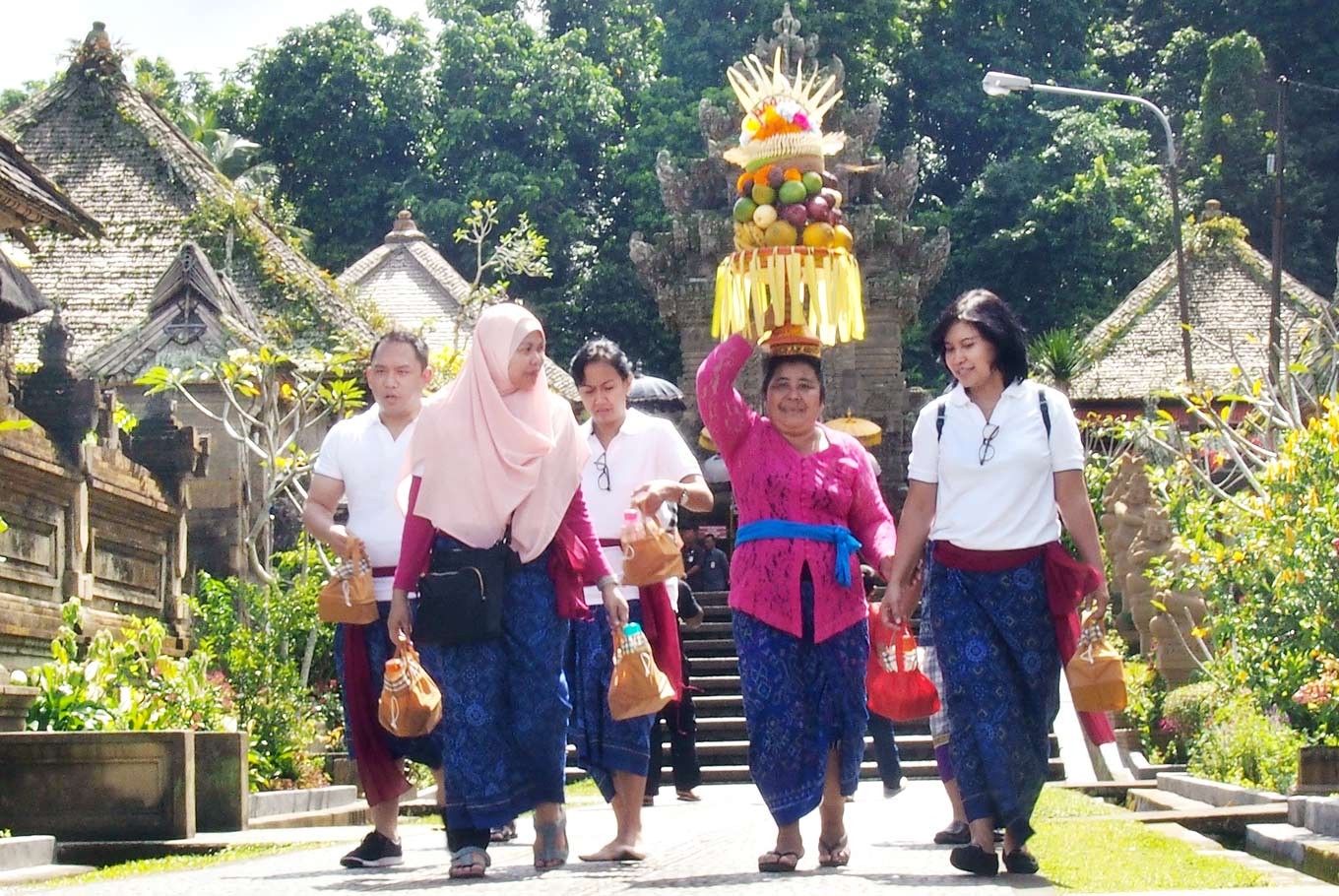Popular Reads
Top Results
Can't find what you're looking for?
View all search resultsPopular Reads
Top Results
Can't find what you're looking for?
View all search results'Real Bali' as Western construct: Rethinking tourism's 'ruination' of Bali
The “real Bali” that many people refer to, imagined as an enduring paradise with an immutable, rich culture, was not created by the Balinese.
Change text size
Gift Premium Articles
to Anyone
A
nyone even remotely familiar with the tourism industry of Bali has inevitably heard the question: “Is tourism ruining Bali?” This question has become the central topic of clichéd debate among both short-term tourists and long-term residents, in which the same points about traffic, unfettered development and the disappearing “real” Bali are beaten to the ground. Most look nostalgically to the past, to a time when visitors could still engage authentically with the “real” Bali.
As an American university student on a gap year studying economic transformations in Balinese communities, I, too, have become well acquainted with this question. Most recently, I listened to multiple discussions on the topic at the recent Ubud Writers and Readers Festival (UWRF). Especially in the wake of the Indonesian government’s plan to develop “10 New Balis,” it is clear that the sustainability of the Balinese tourism industry in all its forms must be addressed. But what struck me as missing from these discussions was a reflexive, critical look into the very idea of a “ruined” Bali.
At the most basic level, "ruined" implies that there was something pure, that an authentic and pristine Bali once existed and that it is now threatened. But the “real Bali” that many people refer to, imagined as an enduring paradise with an immutable, rich culture, was not created by the Balinese. Rather, it was a Dutch colonial construction originally developed to justify the bloody takeover of the island.
In response to their international embarrassment over the puputan (mass suicide) that preceded its colonial rule, the Dutch decided that Bali had a rich, spiritual culture in need of preservation. Maintaining Balinese culture, then, would be a merit of Dutch colonial policy, although at times this incorporated the Dutch colonists' interpretation of Balinese culture and clashed with what the Balinese people actually wanted. Many cultural aspects of Bali that we now take for granted as signature institutions, like terraced rice fields and the caste system, are, in part, a product of this Dutch policy.
The Western artists who flocked to the island following the advent of Dutch rule promoted the Netherlands’ Balinese narrative. Brush stroke by brush stroke, these artists not only constructed Bali as a “living museum”, but also added their own paradisiacal impressions of Bali, based on Edenic and Orientalist themes that were foreign to the Balinese, to create the image still widely accepted today.
Their artwork were displayed across the world, bringing to the island generations of tourists seeking to experience the artists’ renditions of Bali. But no matter how much interaction painters like Walter Spies and Willem Dooijewaard had with the Balinese people, their illustrations were not Balinese representations of Bali; they could only be representative of the experiences of a Western elite. As a result, the image of "Bali as paradise" was an inauthentic construction.
All this colonial history coalesces into a singular point: that the “real” Bali people cite as “ruined” was never Balinese. While a key tenet of tourism is creating an image and identity, the Balinese were not in control of the foundational identity upon which the island's tourism industry was built. Failure to recognize this simply legitimizes tourism as a colonial construct that has effaced genuinely Balinese experiences.
Not only is the basic premise of a “ruined" Bali misguided, but so too are the reasons most commonly touted. At the UWRF, one moderator of a panel discussion on tourism’s effects on Bali asked the panelists how the commodification of culture in Bali was stripping it of value. He was referring to supposed changes made to the meaning of culture and religion when tourists paid to participate in such events.
The issue with this question is that it imposes Western ideas of religion on Balinese Hinduism. The famed anthropologist Clifford Geertz described Balinese religion as an orthopraxy, which places utmost importance on correct conduct and rituals. This is in direct contrast to an orthodoxy, which emphasizes adherence to correct beliefs and better describes Western religions like Christianity and Judaism.
Spiritual meaning in Balinese Hinduism, then, derives from following established rituals and practices, not from their sacredness. Hence, positing that paying audiences profane Balinese religion is a misunderstanding founded in the imposition of the Western conception of sacredness.
Another reason commonly given to support the argument for a “ruined Bali" is the environmental impact of mass development on the island, which is well documented. However, saying that tourism has ruined the Balinese environment implies that tourism is a hegemonic institution that is bearing down on the Balinese people. This ignores the agency the Balinese exercise in harnessing tourism to support their environment and communities.
During my work in Indonesia, I have seen farmers' cooperatives that are designing agricultural volunteering opportunities for visitors that maintain environmentally sustainable land uses while honoring the origins of Balinese culture – rice cultivation. Their innovation must be recognized and supported; these are the stories and lessons that should be shared among whatever new Balis that are built.
The argument that tourism has ruined Bali promotes two harmful misrepresentations: First, it legitimizes the construct of the “real Bali" rooted in Dutch colonial attempts to gloss over atrocities and which was created by Westerners, not the Balinese; second, it ignores the many ways though which the Balinese have appropriated an industry foisted on them to create a better community.
Interestingly, I have heard this critique more from foreigners than from the Balinese people I interact with, who usually do not force such a judgment upon the island's tourism industry.
What is especially pernicious about the “ruined Bali” argument, then, is that its proponents speak with good intentions. Many are hyperconscious of interacting sensitively with Bali and the Balinese, but in their well-intended attempt to protect the island, they ultimately reinforce inauthentic colonial and neo-colonial narratives that ignore the Balinese experience and agency.
We need to move away from these kinds of forceful judgments that reduce the complexity of tourism in Bali and instead focus on more nuanced perspectives. In our efforts to find solutions to address the real problems of sustainability on the island, we must also make an effort to remember what tourism really is for Bali.
***
The writer is a Yale University undergraduate studying economics, human rights and Southeast Asia who is currently interning with Friends of the National Parks Foundation in Ubud.
---------------
Interested in writing for thejakartapost.com? We are looking for information and opinions from experts in a variety of fields or others with appropriate writing skills. The content must be original on the following topics: lifestyle (beauty, fashion, food), entertainment, science & technology, health, parenting, social media, travel, and sports. Send your piece to community@jakpost.com. For more information click here.







